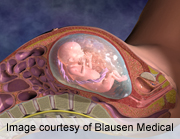
THURSDAY, Sept. 19 (HealthDay News) — Being born to a mother with a thin placenta — the organ that nourishes the fetus — may increase the chances of developing sudden cardiac death as an adult, new research suggests.
“People [born to mothers] with the thinnest placentas were twice as likely to have sudden cardiac death,” said study author Dr. David Barker, a professor of cardiovascular medicine at Oregon Health & Science University.
The report is published online Sept. 19 in the International Journal of Epidemiology.
Up to 5 million people a year worldwide die of sudden cardiac death, according to study background information.
Barker and his colleagues looked at the records of more than 13,000 men and women born in Helsinki, Finland during the years 1934 to 1944.
The researchers looked at cases of sudden cardiac death that occurred outside hospitals. They found that 187 men and 47 women had died of sudden, unexplained cardiac death.
Then they looked back at birth records and found the link between thin placentas and sudden cardiac death. They only found an association, however, not a cause-and-effect relationship.
Why the apparent link? The thin placenta may lead to malnutrition of the unborn baby, the researchers said. Sudden cardiac death in this group of men and women was also associated with low socioeconomic status and low educational level. The low educational level, the researchers said, may spring from the malnutrition, which in turn may hamper prenatal development.
The researchers did not find a link with birth weight, birth length or how long pregnancies lasted and sudden cardiac death.
The researchers noted limitations to the study, including that the measurements were made 70 years ago and that their quality was not checked routinely.
“This is a novel finding that adds to the literature suggesting that heart disease originates in the placenta,” Barker said.
However, he said, the thickness of a woman’s placenta is outside her control. So there is no immediate take-home message from the research.
Even so, the finding has value, said Dr. Norman Abramson, chairman of the board of directors for the Sudden Cardiac Arrest Foundation.
The new research, he said, may lead to ways to predict future development of heart problems.
While sudden cardiac death is unpredictable, some people are known to be at higher risk, said Mary Newman, the foundation president. “If you have a relative who died suddenly and was under 50, you could be at risk for sudden cardiac arrest,” she said.
You can be checked for the heart rhythm problems that can lead to cardiac arrest and death, she said.
“If you tend to faint when exerting yourself, that’s another sign [you should be checked out],” Newman said.
More information
To learn more about sudden cardiac arrest, visit the U.S. National Institutes of Health.

